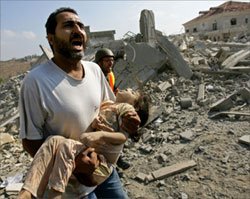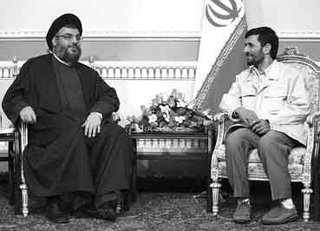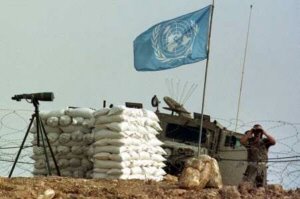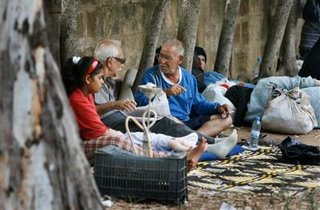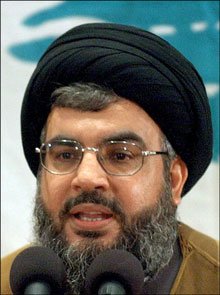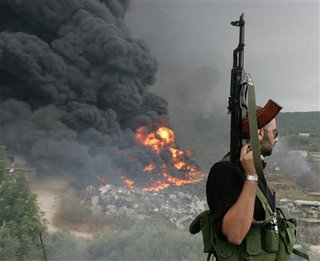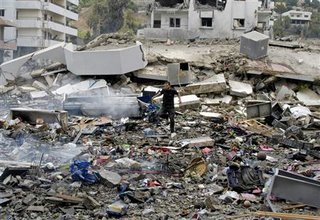Arc of Instability

Not too long ago, President Bush and friends were claiming that the so-called “war on terrorism” was going extremely well, and that Iraq, the second main step in this war, was on the brink of becoming a stable democracy which would shine across the entire Muslim world and serve as an example of what, with a little nudge, can be accomplished. Even the few analysts and pundits who, during the years following the September 11, 2001 terrorist attacks in New York and Washington, had expressed doubt at Bush’s strategy, were starting to wonder if he and his coterie may not have been right after all. The successive overthrow of repressive regimes in Afghanistan and Iraq provided some hope that stability and democracy might just be around the corner for the long-embattled region. It even seemed that the spirit of democracy would indeed spread, what with the ousting of Syrian troops from Lebanon and elections within the militarily-occupied Palestinian Bantustan.
And then, like a house of cards, everything came crashing down. With very few exceptions, the one constant in the long list of things that are taking a turn for the worse is U.S. involvement. Within a matter of weeks, the entire Middle East has been shaken by a series of destabilizing events that represent a serious threat to the entire U.S. strategy of the past five years.
The first hot spot in what we could call the Arc of Instability is Somalia, where U.S. troops and the U.N. tried to bring some stability in the early 1990s after a devastating civil war and an attendant humanitarian catastrophe. Soon after President Clinton came to power, the U.S. pulled out of the country, and except for a few brave humanitarian workers who stayed behind, the rest of the world pretty much did its best to forget about Mogadishu. Luckily for the U.S. (and to a certain extent, Somalis), the main architects of the debacle, dictator Siad Barre and warlord Mohammed Farah Aidid, died of natural causes in 1995 and 1996, respectively. With them, the shadow of civil war had receded. But by no means were the systemic and societal problems that had given rise to the conflict in the first place ever addressed—and as a result, those are rearing their ugly heads again today. The U.S.-backed (this is perhaps an overstatement) regime is currently under assault by Islamist forces and is receiving a certain amount of military assistance from Christian neighbor Ethiopia, which has mobilized troops along the border and sent a small number of troops into Somalia. As a result, the Islamic insurgents have all but declared war on Ethiopia. Once again, through negligence to complete the job, the Horn of Africa is on the brink of spiraling out of control. This time around, though, it is very unlikely that the U.S. will deploy its military to the poor country, and this for two principal reasons. First, the trauma of Mogadishu is still fresh in the U.S. military psyche, and no one wants a repeat. The world has changed a lot since Bush Sr. was at the helm, and long gone are the dreams of saving the war-torn nation from itself. Secondly, as Somalia currently does not register very high geopolitically (other than as a source of terrorism, as some would claim), and as the U.S. military is already stretched to the limit, a deployment to the Horn of Africa would be logistically impossible. War will rage in Somalia, with the risk that Ethiopia, which doesn’t want an Islamic regime—and an unstable one at that—as a neighbor, will be drawn in.
Meanwhile, a humanitarian catastrophe continues in the Sudan. The international community has produced no small amount of communiqués and resolutions calling for a deployment to the region, but for lack of resources, will, or courage, nothing substantial has been accomplished. This conflict continues to represent a threat to the entire region and could draw other countries into it.
Whatever passed off as a Peace Process between Israel and Palestine is in shambles. Gaza is being pounded, and more than a hundred Palestinians—almost all civilians, again—have been killed in the past month and a half. Most Palestinian institutions of state have been destroyed, half of the Palestinian Authority has been arrested (many on utterly spurious charges by Israel) without even being given a chance to govern, and the other half is hiding somewhere. Washington’s song about democracy sounded really hollow when it refused to recognize the electoral win by some Hamas candidates and instead chose to isolate and sanction the PA. Given that when it comes to Israel the U.S. has once again proven itself to be a dishonest broker, Palestinians have no one to turn to to negotiate a viable peace. Those who do will be accused of cooperating with the military occupation, and those who have lost all hope will resort to violence—resistance with stones and slingshots (since the Palestinian have no military), or the self-defeating recourse to terrorism, actions of the few that only manage to sully the image of a people that otherwise should have the moral high ground. Israel, meanwhile, will continue to use its military to create a security that it simply cannot achieve militarily. Furthermore, it will keep committing war crimes with impunity thanks to the support, both moral and financial, of the U.S. Palestinians are fighting a war of resistance, a war against a military occupation, but both sides seem to fail to understand that such wars cannot be won by either side, assassination of leadership, suicide bombing, collective punishment and ethnic cleansing notwithstanding. To think that for many years Israeli administrations, along with the U.S. and certain other states, blurted ad nauseam how Yasir Arafat was the reason why there couldn’t be peace between Israel and the Palestinians. One could be forgiven for asking why then, long after the corrupt and generally ineffective leader of the Palestinian people has departed the scene, the fate of the Palestinians has not improved by an inch and in many ways has actually deteriorated.
Next door, thanks to indiscriminate Israeli bombing and sanctions, Lebanon’s reconstruction, after a brutal civil war, has been pushed back by who knows how many years. Its government has been weakened by two weeks of Israeli onslaught—perhaps beyond repair. Hezbollah and Israel are fighting it off, and despite Israel’s claims that a few weeks will be necessary to eradicate the militant group, it will never manage to accomplish this. Hezbollah is too widespread and knows its territory so well that, like any guerrilla group, it can simply disappear underground and wait for a better day. In the long run, all that Israel can hope to accomplish is the further destruction of Lebanon and the attendant hatred that this will give rise to—both in Lebanon and within the region. History has proven, time and again, that widespread assaults such as the one that Israel has launched against Hezbollah will only result in increased support and admiration for the militant group. There, as in the Occupied Territories, Israel continues to wage war and commit crimes of war with impunity, in the process further damaging the reputation of the U.S.
Meanwhile—and given the media focus on Lebanon this story has been nearly forgotten—Iraq is truly facing the long-feared threat of civil war. Despite American hubris following the February elections and the subsequent creation of the Nuri al-Maliki government, Iraq is starting to show all the symptoms of a failed state. Nearly 7,000 violent deaths have occurred in Baghdad since January 2006 (and more than 14,000 country-wide), and the intensity of the attacks against all aspects of civilian institutions is increasing. To give readers an idea of what that means, in all of 2005 there were 78 murders in Toronto (and this was a bad year), a city with a population size somewhat similar to that of Baghdad. This means that over a twelve month period, 78 murders would be committed in Toronto to Baghdad’s conservative figure of 14,000! Baghdadis are fleeing the city en masse, and the refugee and internationally-displaced population is getting dangerously high. Most Iraqis have seen no improvement, and many have actually seen a degradation, in their living standards since the 2003 invasion. There are now talks of sending even more U.S. soldiers to Iraq—the very opposite of what we had been told in the past months.
Next door, Iran continues to defy the international community on the nuclear issue. This defiance is accompanied by, and perhaps partly results from, the position of primacy that Iran has recently acquired in the region—in Iraq as well as in Syria and, recently, Lebanon. EU efforts notwithstanding, a peaceful resolution to the nuclear issue is highly unlikely, even more so now that Washington has all but given India the exceptional green light to break all the non-proliferation treaties (as it has Israel, which has nuclear weapons). What this means, then, is that recourse to force—by Israel or the U.S.—to destroy suspected nuclear facilities is increasingly likely, to which Tehran would most assuredly retaliate. Iran has needlessly been alienated and isolated by the international community, and at the same time events in the Middle East have allowed it to expand its authority. All of which doesn’t bode especially well for the U.S.’s standing in the region. The looming confrontation with Iran is sure to put the lie to Washington’s and Jerusalem’s overwhelmingly militarized and bellicose way of dealing with foreign policy.
We then turn to Afghanistan, where just as in Iraq the initial hope of a democratic rehabilitation is quickly being dismembered one bomb at a time. Recent reports indicate that Taliban insurgents are more active today than they have ever been since their overthrow in 2001. As NATO spreads to the south, where the British conceit that they would be able to “rebuild” the region without having to fire a single shot has now been thrown into the dustbin of declarations better not made, and as Canadians plunge into Kandahar and its surroundings, they are facing a population that, as in Iraq, has seen precious little improvement in security and living conditions since they were “liberated” by the Coalition. Other than Kabul, whose security—bar that; survival—is ensured by a large deployment of foreign troops, the rest of Afghanistan continues to be what it has always been—resistant to foreign occupation and virtually unconquerable. Even if the population doesn’t support the Taliban politically, it will nevertheless rally behind it against the imposition of foreign powers—especially so when the latter break into houses and intentionally or, as is more likely, otherwise, humiliate the Afghan population. Meanwhile, after four years of training by foreign powers, the Afghan army remains ineffective and unable to address security within the country. If foreign occupation powers were to leave tomorrow, by the end of the week Afghanistan would fall back into the state it was in after the expulsion of the Soviets from its territory.
Afghanistan’s neighbor Pakistan, meanwhile, is allegedly in the process of building a nuclear reactor capable of producing enough plutonium for the building of dozens of nuclear weapons. This, of course, shouldn’t come as a surprise, as another ally of the U.S., India, has not only been receiving help from Washington with its civilian nuclear program, but as we have seen, it has been given the White House’s blessing to pursue a military nuclear program as well. Consequently, an altogether avoidable nuclear arms race has been allowed—by Washington, the champion of world security and the very vanguard against the development of nuclear weapons by the world’s worst villains, from Iran to North Korea—to pick up speed. No wonder Iran would like to become a nuclear power, too, given that it is sandwiched between a nuclear Israel and nuclear India and Pakistan.
Thus ends our very brief introduction to the Arc of Instability. Everything in between is also being affected by, drawn into, and in return exerting influence on, what is going on inside it. It is interesting to note that in almost every case, the situation has worsened as a result of either direct or indirect U.S. action, from support for an illegal military occupation and indifference to the suffering of a people that borders on racism, to the ill-planned and shortsighted invasion of two Muslim states. This is not to say that the U.S. necessarily has macabre or even entirely malicious intentions vis-à-vis the Middle East. But it shows, beyond any doubt, that the hubris, the self-righteousness and missionary zeal with which it plunged into the region was, at best, delusional. The entire region is now paying the price, and so will the rest of the world.
 I hope I am wrong when I write this, but the risibly incompetent U.S. secretary of state Condoleezza Rice is suffering from confabulation when she claims that a ceasefire and truce between Israel and Hezbollah can both be accomplished within a week. The reason—and it has already been given a number of times by Israeli officials—is that to end the hostilities now would represent a victory for Hezbollah. From Jerusalem's perspective, a victorious Hezbollah (meaning one that wasn't destroyed through a three-week air campaign) would send a message to the world that Israel's powerful military is weaker than was originally believed, and that states and non-state actors in the region are free to fire missiles into Israeli territory with impunity. Again, Israel's hallucinogenic and pathologically paranoid view of the world prevents its leaders from taking a more logical (and peaceful) course. Propaganda aside, everybody except Israel itself has by now reached the conclusion that the total destruction of the Jewish state is an impossible and self-defeating task. In other words, no state in the region is suicidal (remember, Israel has nuclear weapons and is backed by the most powerful military in history); only a few individuals are, and this tactic is going nowhere fast. What is needed is accommodation—but a just one; not a peace that leaves millions of Palestinians under a military occupation that treats them as less than human or exposes Lebanon to the occasional Israeli violation of its territory and/or airspace or the murder of hundreds of its civilians every ten years or so.
I hope I am wrong when I write this, but the risibly incompetent U.S. secretary of state Condoleezza Rice is suffering from confabulation when she claims that a ceasefire and truce between Israel and Hezbollah can both be accomplished within a week. The reason—and it has already been given a number of times by Israeli officials—is that to end the hostilities now would represent a victory for Hezbollah. From Jerusalem's perspective, a victorious Hezbollah (meaning one that wasn't destroyed through a three-week air campaign) would send a message to the world that Israel's powerful military is weaker than was originally believed, and that states and non-state actors in the region are free to fire missiles into Israeli territory with impunity. Again, Israel's hallucinogenic and pathologically paranoid view of the world prevents its leaders from taking a more logical (and peaceful) course. Propaganda aside, everybody except Israel itself has by now reached the conclusion that the total destruction of the Jewish state is an impossible and self-defeating task. In other words, no state in the region is suicidal (remember, Israel has nuclear weapons and is backed by the most powerful military in history); only a few individuals are, and this tactic is going nowhere fast. What is needed is accommodation—but a just one; not a peace that leaves millions of Palestinians under a military occupation that treats them as less than human or exposes Lebanon to the occasional Israeli violation of its territory and/or airspace or the murder of hundreds of its civilians every ten years or so.


